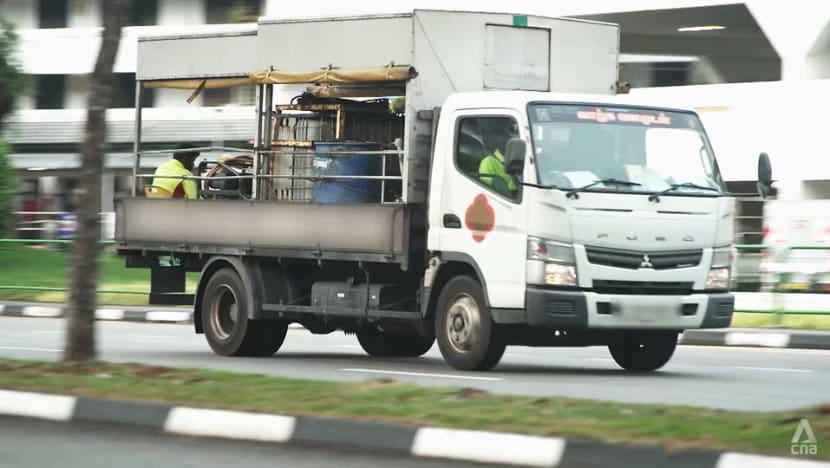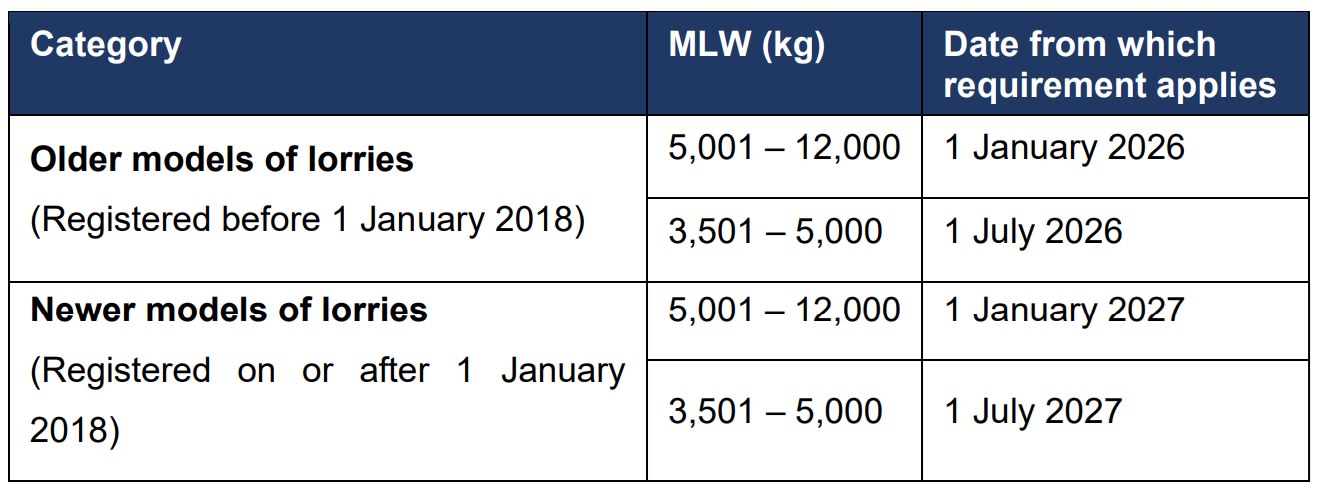Mandatory speed limiters fitted on only about 50 lorries since Jan 2024: Shanmugam
Speed limiters ensure that these vehicles do not exceed a speed limit of 60kmh.PHOTO: ST FILE
Vanessa Paige Chelvan
Jan 16, 2025
SINGAPORE – The authorities can prioritise lorries used to transport workers when it comes to the installation of speed limiters, as only around 50 lorries out of thousands on the road have been fitted with them so far.
This was a suggestion made by Mr Lim Kian Chin, chairman of the Singapore Transport Association (STA), to boost the low installation rate of speed limiters, which are required for lorries with a maximum laden weight (MLW) of between 3,501kg and 12,000kg.
Speed limiters ensure that these vehicles do not exceed a speed limit of 60kmh.
Home Affairs Minister K. Shanmugam told Parliament on Jan 7 that as at end-2024, only around 50 lorries have completed the installation of speed limiters.
In response to queries, the Traffic Police (TP) said that as at end-2024, there were about 17,000 eligible lorries which are required to install speed limiters.
This means that speed limiters have been installed in less than 1 per cent of eligible lorries.
TP, which started the installation of speed limiters for eligible lorries in January 2024, “is concerned by the low installation rate”, Mr Shanmugam said in a written reply.
He was responding to a question from Nee Soon GRC MP Louis Ng, who had asked what percentage of lorries that require a speed limiter to be installed have done so.
Speaking to The Straits Times, Mr Ng said it was “disappointing” that only 50 lorries have met this requirement.
“It is quite a while more before it becomes mandatory (from 2026),” he said. In the meantime, “the lives and limbs of hundreds and thousands of workers” are at risk.
Mr Ng, who has long advocated the safety of workers being ferried around on the back of lorries, pointed to a recent accident on Dec 15, 2024.
A 40-year-old man, one of several workers travelling on the back of a lorry, died after an accident in Tuas. Two male passengers were also injured in the incident.
A 41-year-old male lorry driver is being investigated for a negligent act causing death.
While Mr Ng acknowledged that not all accidents are due to speeding, he said that “whatever we can do (to make things safer), we should do. One of them is speed limiters”.
Mr Shanmugam urged lorry owners to install speed limiters early, ahead of the compliance deadlines, to avoid a bottleneck at workshops.
“Eligible lorries that fail to comply by the deadlines will be liable for an offence, and will fail their periodic inspection,” he warned.
Mr Shanmugam said TP is working with authorised motor distributors, the Motor Traders Association of Singapore and authorised inspection centres to encourage more lorry owners to install speed limiters early.
According to TP, it has sent out about 7,000 SMS reminders since July 2024 to all lorry owners whose vehicles are covered by the new regulations, and will continue to do so on a quarterly basis until the deadlines, TP said.
Mr Lim, the STA chairman, said that while he supports the use of speed limiters, he thinks lorry owners “will wait until the last minute and rush to go and get them installed”.
“These are normal people,” he said.
“Why would they do it now, when the law says it has to be done by 2026? There’s still one more year to go,” he said when asked about the current low installation rate.
To boost the installation rate, Mr Lim suggested that the authorities prioritise lorries that ferry workers, instead of a “generic timeframe for people to meet”.
Mr Hooi Yu Koh, chief executive of construction engineering company Kori Holdings, also put the low installation rate down to the deadline being “far away, so there is no necessity to rush”.
He also pointed out that there was a limited number of suppliers and installers in 2024 when the requirement was first rolled out.
But he said his firm, which leases its three lorries, had in mid- to late-2024 asked its supplier to provide them with lorries equipped with speed limiters for “safety benefits”.
He said there are “no drawbacks” to speed limiters, and he is assured that the drivers whom Kori Holdings hires to transport its workers will not speed.
Mr Kenneth Yap, assistant general manager of after sales at Goldbell Engineering, an authorised agent for the installation of speed limiters, said the take-up rate has been low.
“Customers are often hesitant to incur the added expense up front (when registering new vehicles), and with the regulatory deadline still some time away, many customers do not feel an urgency to proceed with installation,” he added.
Installation costs range from $350 to $1,400, depending on the type of speed limiter required for each vehicle model, Mr Yap said.
However, he expects demand to rise as the deadline approaches, and he is noticing that more lorry owners are ready to install speed limiters now.
Goldbell has already done so on its Fuso trucks, of which it is the authorised distributor, he added.
In November 2023, TP announced that to improve safety, lighter lorries with an MLW of between 3,501kg and 12,000kg would be required to have speed limiters.
It was already compulsory for goods vehicles with an MLW exceeding 12,000kg to have a speed limiter installed.
For lorries registered before 2018, a speed limiter must be installed before 2026 if their MLW is between 5,001kg and 12,000kg, and before July 2026 for those with an MLW of between 3,501kg and 5,000kg.
For newer lorries registered from 2018, drivers will have to install the device before 2027 if the MLW of their vehicle is between 5,001kg and 12,000kg, and before July 2027 if the MLW is between 3,501kg and 5,000kg.
Speed limiters will also be required for imported lorries to be approved from 2026.
These devices can improve road safety and driving behaviour, and when combined with other measures like enforcement, they help to reduce fatalities and injuries among road users.
“It is particularly important for larger and heavier vehicles not to speed, given the increased risks they pose to other road users,” TP said.
On Dec 28, 2024, a 58-year-old motorcyclist died on the spot in an accident involving a lorry on the Ayer Rajah Expressway. The lorry driver, a 46-year-old man, was arrested on suspicion of causing death by negligent act.
Days later, on Dec 31, 2024, two lorry drivers were taken to hospital following a five-vehicle accident in Choa Chu Kang. The accident involved three lorries, one van and one prime mover hauling a container.







